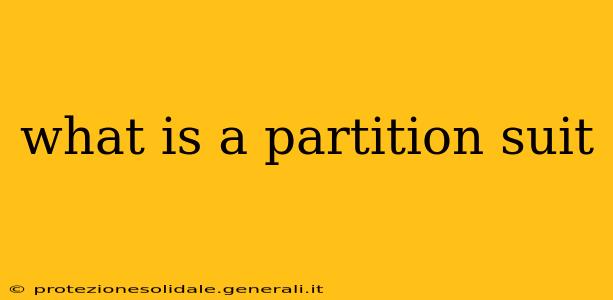A partition suit is a legal action filed in court to divide jointly owned property among the co-owners. This applies to various types of property, including real estate (land and buildings), but can also extend to other assets held in joint ownership. Essentially, it's a mechanism to legally dissolve a joint ownership arrangement when the co-owners can't agree on how to proceed. Understanding the process and its implications is crucial for anyone involved in joint property ownership.
Why is a Partition Suit Necessary?
Disagreements among co-owners are the primary reason for initiating a partition suit. These disagreements can stem from various issues, including:
- Differing opinions on property use: One co-owner might want to develop the property, while another prefers to maintain its current state.
- Disputes over maintenance and repair costs: Unresolved disagreements about who pays for what can easily escalate.
- Inability to agree on a sale: If co-owners cannot agree on a sale price or the terms of a sale, a partition suit may be the only recourse.
- Inheritance disputes: When property is inherited by multiple parties, conflicting interests might necessitate a partition suit.
- Divorce proceedings: In divorce cases, jointly owned assets, including property, often require division, potentially leading to a partition suit.
Types of Partition Suits
There are generally two main types of partition suits:
-
Partition in kind: This involves physically dividing the property among the co-owners. This is often preferred when the property is easily divisible and all parties agree on a fair division. However, this might not always be feasible, especially with indivisible properties.
-
Partition by sale: If dividing the property physically isn't practical or desirable, the court may order a sale of the property. The proceeds from the sale are then divided among the co-owners according to their respective ownership shares. This is often the most common outcome, particularly when dealing with a single, indivisible property.
What Happens During a Partition Suit?
The process typically involves several steps:
-
Filing the lawsuit: A co-owner files a petition with the court, outlining the reasons for seeking partition.
-
Notice to co-owners: The court notifies all co-owners of the lawsuit.
-
Court hearings and discovery: The court holds hearings to determine the facts of the case and gather evidence, including appraisals of the property's value.
-
Negotiation and settlement: The court encourages the parties to reach a settlement outside of a full trial.
-
Trial (if necessary): If a settlement can't be reached, the case proceeds to trial, where a judge or jury will make a decision.
-
Judgment and execution: The court issues a judgment, determining how the property will be partitioned (in kind or by sale). The judgment is then enforced, resulting in the physical division of the property or its sale and distribution of proceeds.
How to Avoid a Partition Suit
The best way to avoid a partition suit is to have a clear and comprehensive agreement among co-owners regarding the property's ownership, use, maintenance, and potential sale. This might involve:
- A well-drafted co-ownership agreement: A legal document that outlines the rights and responsibilities of each co-owner.
- Open communication and proactive conflict resolution: Addressing disagreements early and amicably can prevent escalation.
- Regular meetings and financial transparency: This ensures everyone is aware of expenses and decisions related to the property.
What are the costs involved in a partition suit?
The costs associated with a partition suit can be significant and vary depending on the complexity of the case, legal representation, and location. Expect to incur expenses related to court filing fees, attorney fees, appraisal costs, and potentially expert witness fees. These costs can significantly eat into the eventual proceeds, particularly if the case proceeds to trial.
Can a partition suit be avoided without selling the property?
Yes, a partition suit can sometimes be avoided without selling the property, particularly if the property is easily divisible and all parties are willing to cooperate. A partition in kind may be possible if the property can be physically divided fairly among the co-owners. However, this often requires professional surveying and potentially, further legal negotiations to ensure a fair division.
This information is for general knowledge only and does not constitute legal advice. Consult with a legal professional for advice specific to your situation.
